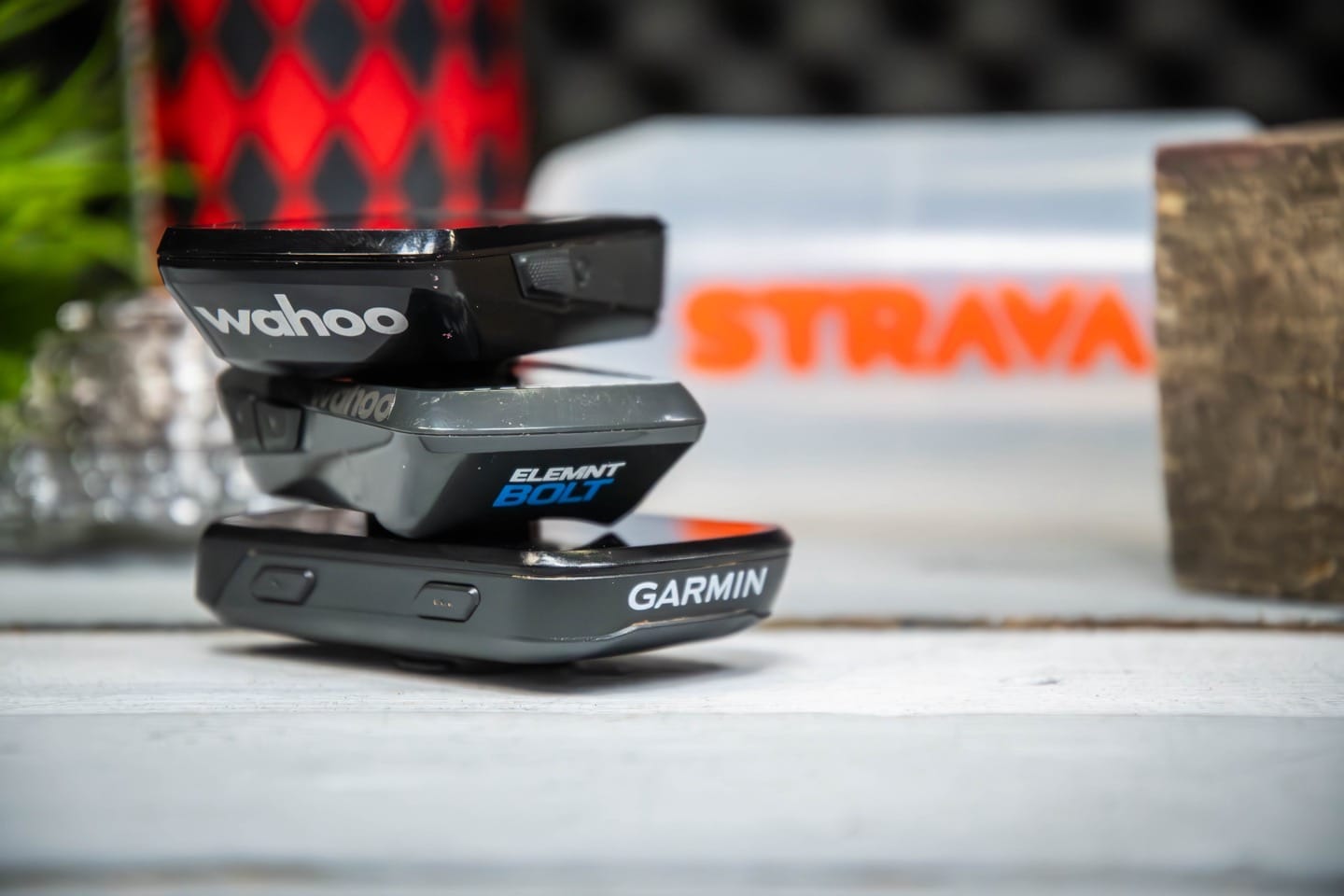
Welcome to 2024, and the year’s first legit DC Rainmaker Sports Tech Rabbit Hole.
Every year Strava publishes their year in review stats, both in individual athlete form (more recently), but many years of total global and regional user-compiled stats. These reports have always had plenty of interesting tidbits and quirky trends. Of course, like most ‘Year in Review’ style annual reports, these trends are often created/worded in ways that make them more interesting to dig through. Sure, Strava still lists total stats and such, but most of that becomes kinda repetitive year after year – especially at Strava’s scale.
Thus, this year they added a new section – which was ‘This Year’s Top Gear’, which included top gear in things like bike brands, running shoes, and upload devices. Here’s this year’s section on that, for both the US & Global:
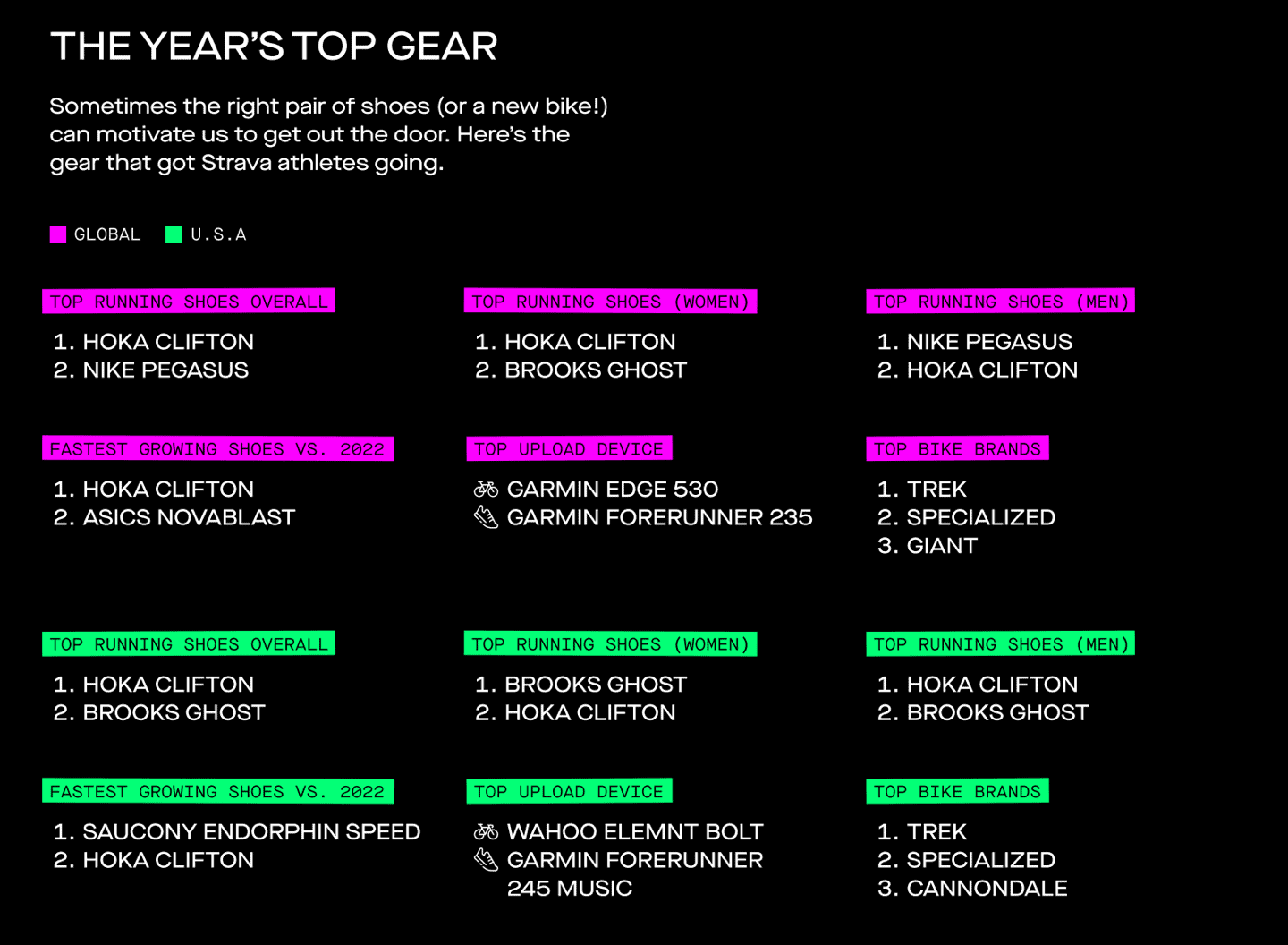
Part of this section is user-maintained (meaning, each user manually types out ‘Trek Pedaling Thingy’ or ‘Asics Footsy’, and then Strava matches based on that (or some loose matching logic). Ultimately though, in those cases, there is nothing in your activity file that is electronically inserting/connecting what brand of shoe you were wearing or bike you were riding (yes, this technology does actually exist for both bikes and running shoes, but Strava doesn’t really leverage it, which is logical given how limited the reach is).
Inversely, some of the report Top Gear data is indeed computer-driven, specifically around the bike computer and watch uploads. This data comes from a blend of data in the files that devices upload, as well as some manual massaging of the data on Strava’s side. Essentially, devices upload the actual device name in the files (which can be a bit messier, often a SKU number, internal model name, or such), but Strava will give it the official brand/model name, one that users actually understand and recognize (and probably what you call your device).
Now, at this point eagle-eyed spotters (including The5KRunner) may have noticed this particular line item on this chart, the cycling upload computer:
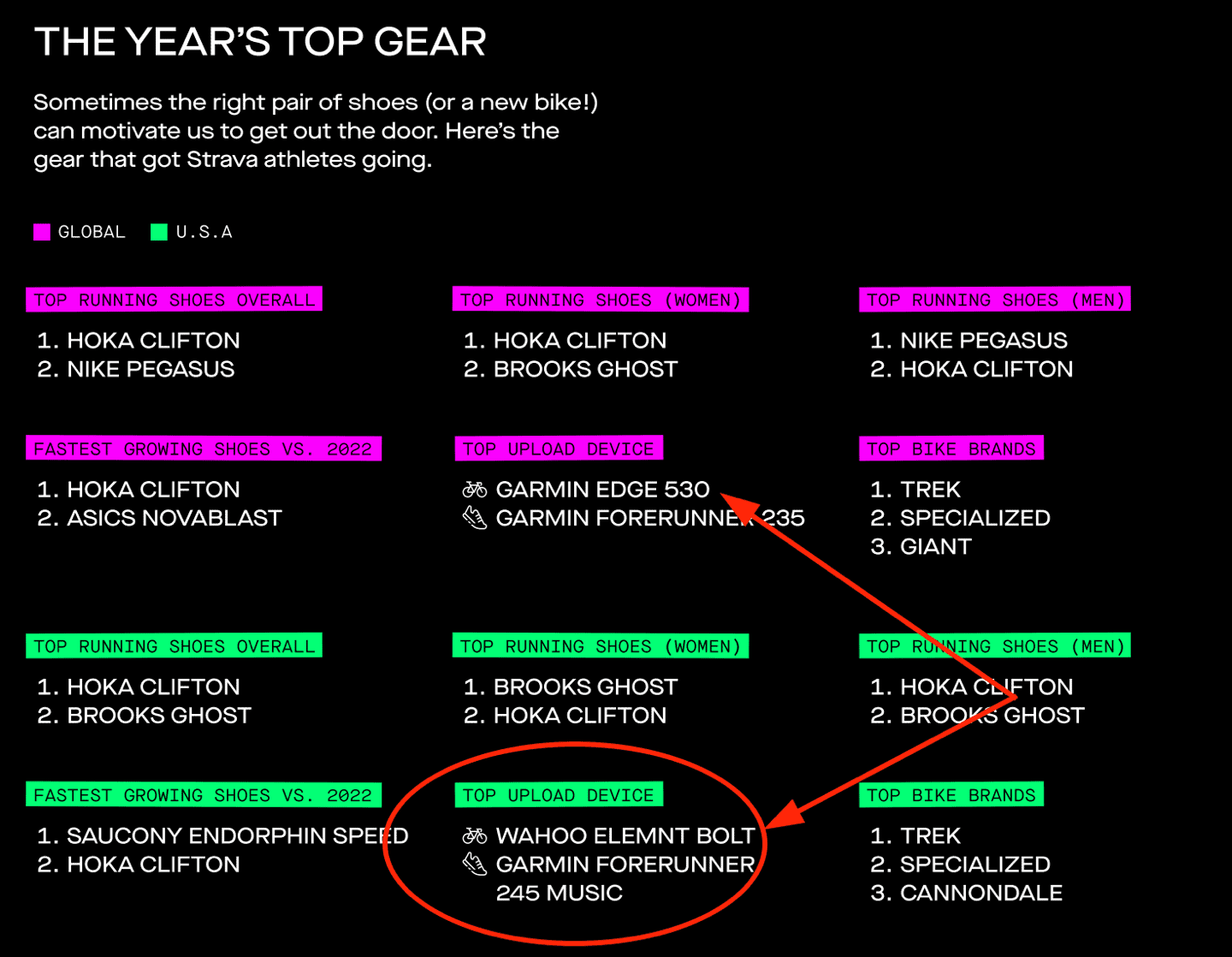
In the report it states that the Wahoo BOLT is the most popular upload bike computer in the US (whereas globally it’s the Garmin Edge 530). And while the Wahoo BOLT is very popular and well-loved, there’s simply no data that supports it being *THE* most popular upload device in 2023. After all, Wahoo now has multiple versions of the Wahoo BOLT: The Wahoo BOLT V1 (2017), and the Wahoo BOLT V2 (2021). In the same way that Garmin has the Edge 500, 510, 520, 530, 540, and so on. Just as Apple had the Apple Watch, Apple Watch Series 2, 3, 4, 5, 6, 7, 8, and 9, plus Ultra’s and SE’s. In the case of all of those, as well as almost every other company/model, Strava lists them individually, for example, here’s a Garmin Edge 840 upload:
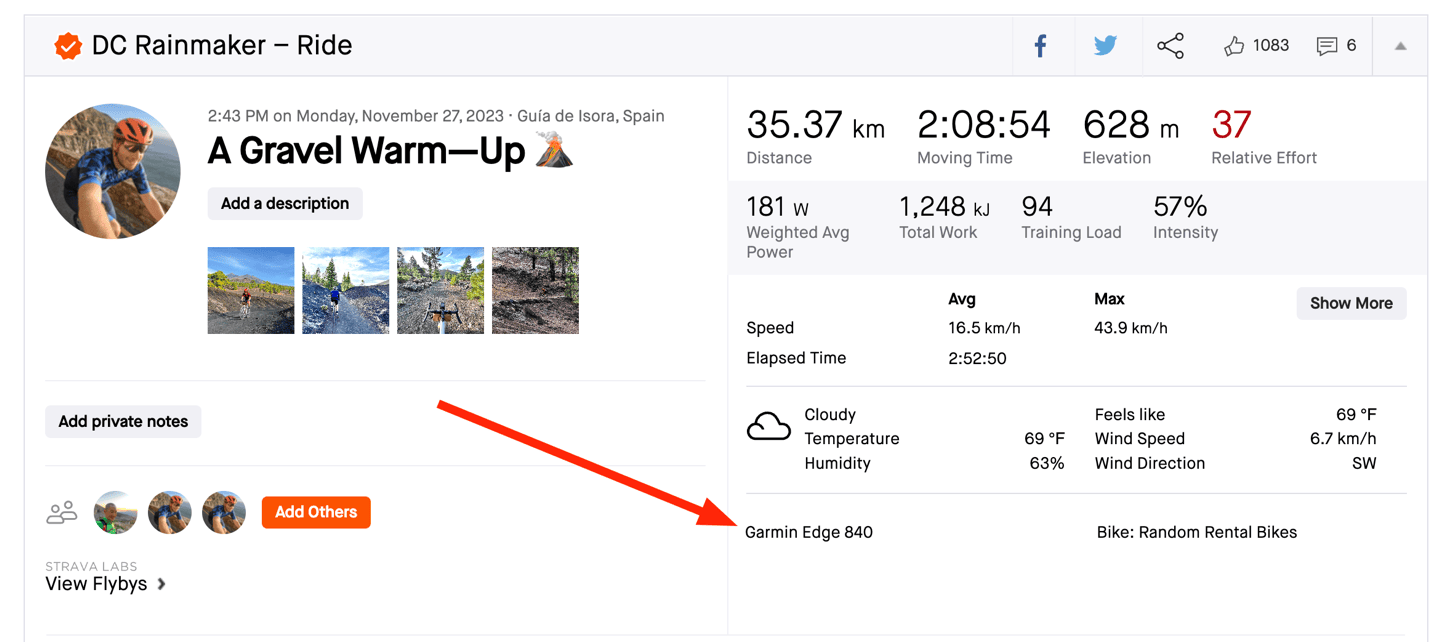
How does this work? Well, in the files you upload (generally a .FIT file, but sometimes other formats like .TCX or .GPX), it’ll include details on the manufacturer and model information. Here’s how that looks for a Wahoo BOLT V2:
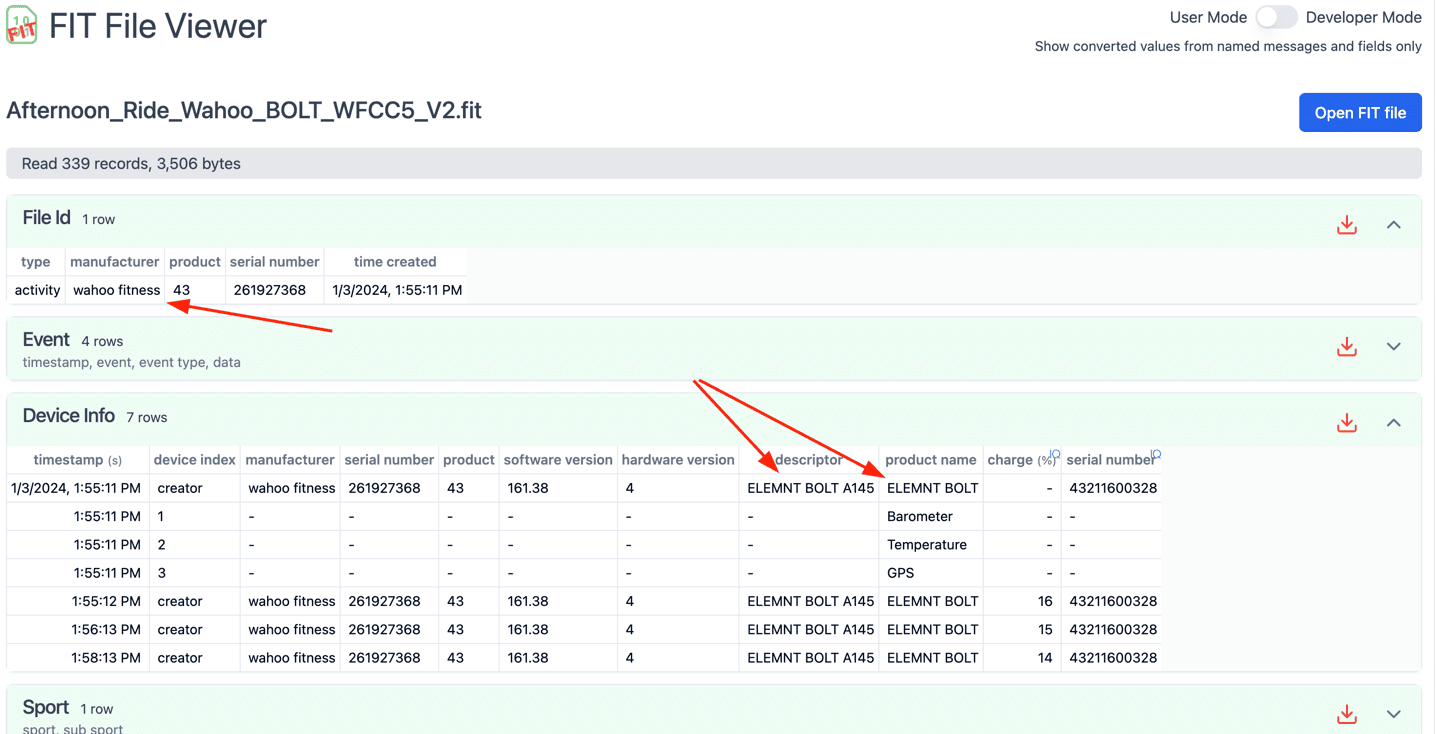
You can see the model name listed there “Wahoo BOLT A145”. That’s actually the internal reference code that Wahoo uses (if you go into the Systems > About page on your Wahoo BOLT V2, it’ll show ‘ELEMNT BOLT A145’). In any case, Wahoo sends an e-mail to Strava’s devices team, which then links that internal reference name (A145) to a pretty name (Wahoo ELEMENT BOLT). When Strava doesn’t have a corresponding entry in their database, a device upload will be ‘blank’, as in, it won’t show anything at all…just emptiness.
This human-led manual system actually protects all these companies from accidental uploads of unreleased/unannounced devices. These device pairings (effectively secret name to pretty name) are usually lit-up the day the device is announced. In fact, if you look at some of my activities that are ‘blank’ for weeks/months ahead of time (using unreleased devices), then they’ll magically show the correct name the moment the device is announced.
Now, with that backstory, the problem here is that for some odd reason, Strava has combined both the Wahoo BOLT V1 and V2 into a single device name, despite very clearly being two different devices. In fact, even in the files uploaded to Strava (when you select to ‘Export Original Data’ from Strava’s site), very clearly have Wahoo sending over two different device models. Here’s that data enumerated by the ever-awesome FitFileViewer.com – which lets you see inside your .FIT files, from the actual files exported from Strava on two quick tests I did today, using both the BOLT V1 and BOLT V2:
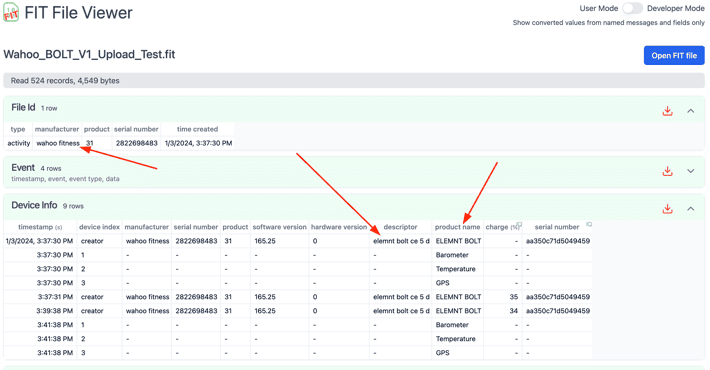
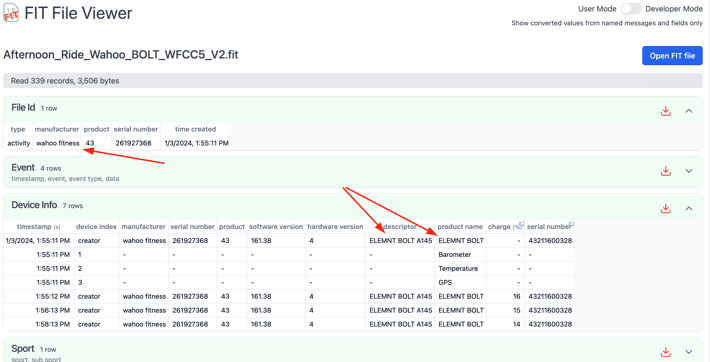
Wahoo BOLT V1 (2017) = Wahoo BOLT CE5D
Wahoo BOLT V2 (2021) = Wahoo BOLT A145
However, in the eyes of Strava, they consolidated this all down into simply ‘Wahoo ELEMNT BOLT’. Whereas for most other companies, they list individual models:
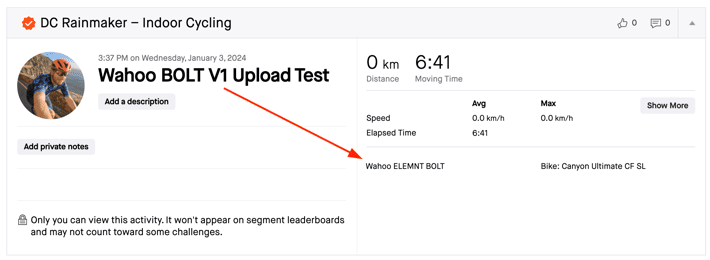
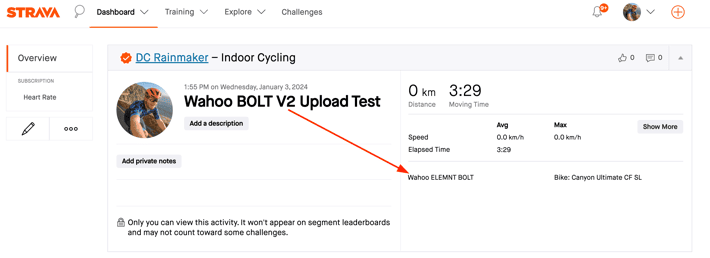
But why does Strava only list a consolidated Wahoo ELEMNT BOLT?
You see, when Wahoo announced the Wahoo BOLT V2, Wahoo’s PR teams at the time went to great lengths to remind journalists/media that the official name of the device was simply the ‘Wahoo Bolt’. Not V2, not 2021, not Wahoo BOLT 2, or anything else. They saw it just like Apple releasing the Apple Mac, or Apple MacBook Pro. No marketing model or such named on the site, just forever one name in most places. Akin to what Wahoo also does for their KICKR trainers.
In fact, I even got in a bit of a back-and-forth with Wahoo and their PR team about this at the time, after I titled my review “Wahoo BOLT V2/2021” rather than just “Wahoo BOLT”. Obviously, I ignored their preferences – because as consumers, we want clarity on what the heck we’re buying. Me titling something after a device name from years prior doesn’t make sense (either for consumers, Google Search algorithms, or heck, even for Wahoo’s goal of selling new model bike computers).
Thus, back in 2021 when Wahoo e-mailed Strava the new model name of the Wahoo BOLT V2 to correspond with ID “A145″, they probably just requested ‘Wahoo ELEMNT BOLT’ instead of ‘Wahoo ELEMNT BOLT V2’ or something else. And for whatever reason, Strava agreed. Thus explaining how two different models spanning 7 years, has managed to unseat one of the most popular bike computers of all time. And in case you’re wondering, yes, the Wahoo ROAM V1 and V2 are both consolidated under a single ‘Wahoo ELEMNT ROAM’ name.
So, armed with all of this useless information, I did what I do best: Stir the pot. Thus…I asked Strava why this was all worked up, and who the actual top-device was.
[Side note: I’m pretty sure the Strava PR folks dread seeing a reply from me in their inbox. It almost always means something has gone sideways. Whereas if it works perfectly, I rarely have need for further communications. Maybe I’ll start sending random happy notes to them too.]
Strava responded within an hour or so, confirming that they’re digging into it. Given they were digging, I let them be for a bit. Then, 24 hours later, I got a response:
“You are correct, the top upload device in the US was printed in error and should be Garmin Edge 530. This correction is being updated now, and the new US fact sheet is available here.” – Strava PR Team, Jan 4th, 2023
They even updated the top of the press release page too:
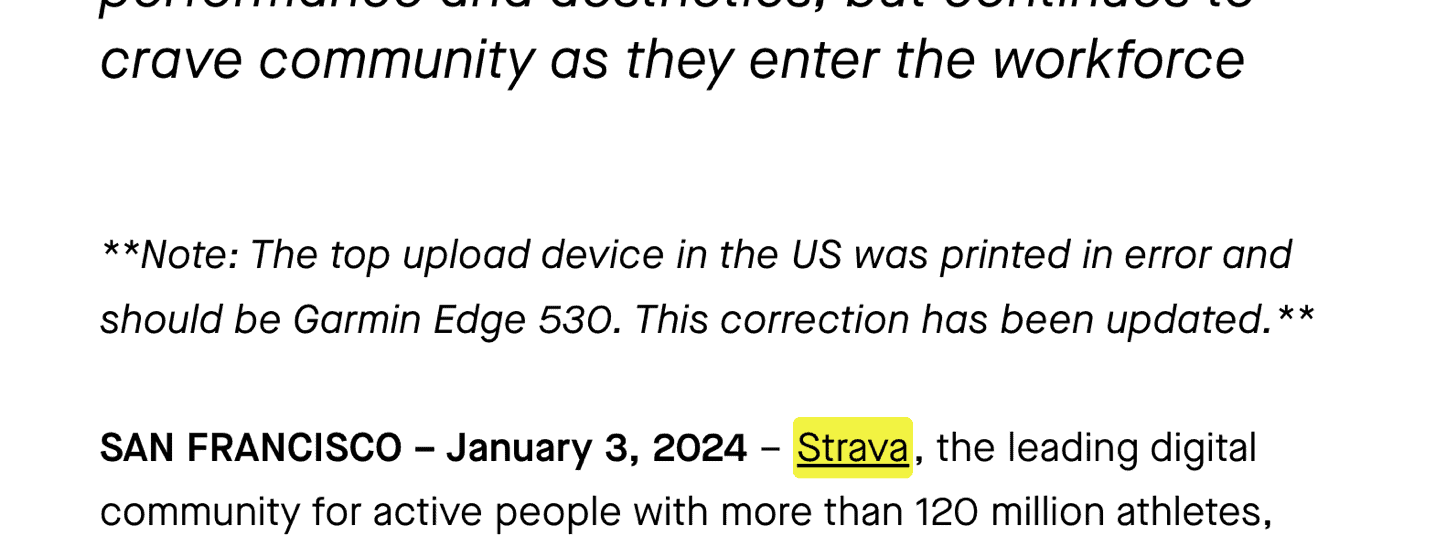
Obviously, my follow-up question was asking whether or not they’re going to properly split-out the Wahoo BOLT units/models going forward, like all other bike computers out there, to which they said:
“Great question – unfortunately, I can’t speak to this at the moment.”
Of course, Wahoo could also easily request Strava update the device name to something unique. Given Wahoo themselves now call it “v2″ on their support pages, perhaps they should go with that. But equally, it’s probably time for Strava to set some rules around this, as Wahoo isn’t the only one. Peloton combines both Peloton Bike & Peloton Bike+, and Whoop just consolidates everything as ‘Whoop’. Certainly, it’s hard to police every tiny device in the world, but when you start talking the biggest fitness companies in the world, it’s not that long a list.
I will now get back to whatever review I was writing before I got distracted with this rabbit hole of a post.
Thanks for reading, and Happy New Year!
0 Commentaires